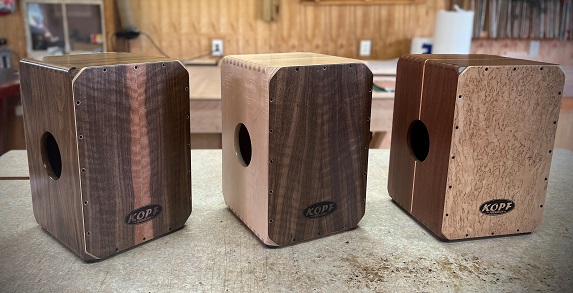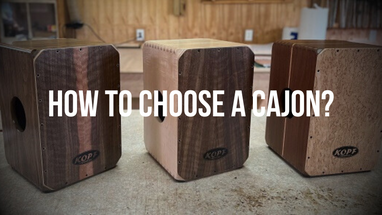Posted by Stephen Head on 8th Jun 2023
How do I choose the right cajon for my skill level as a percussionist, and what features should I look for?
As a cajon builder with years of experience, I've had the privilege of working closely with percussionists of all skill levels and musical styles. It's always exciting to help musicians find the perfect cajon that complements their unique playing style and enhances their musical expression. In this article, I will not only provide insights on how to choose the right cajon for your skill level but also delve into the various features you should consider. So let's dive in!

Skill Level: Finding the Right Match
When it comes to selecting a cajon, your skill level as a percussionist is an essential factor to consider. As a beginner, it's crucial to choose a cajon that is easy to play and provides a balanced combination of bass and snare sounds. Look for cajons with user-friendly designs and consider those with adjustable snare wires, allowing you to experiment with different snare tones and find your preferred sound.
As an intermediate player, you'll likely be seeking a cajon that offers more versatility and control over your sound. Look for cajons with adjustable front plates, which allow you to modify the tone and pitch of the instrument according to your preferences. This feature empowers you to explore a wider range of sounds and adapt to various musical genres.
For advanced players, the quest for a cajon becomes an exciting journey to find an instrument that matches your advanced techniques and demands. You'll want to explore cajons with multiple sound chambers, intricate snare systems, and adjustable front plates. These high-end cajons offer an exceptional level of control and customization, allowing you to craft a unique and personalized sound that resonates with your musical identity.
Size Matters: Finding the Right Fit
The size of the cajon is another crucial aspect to consider. Cajons come in various sizes, ranging from small and compact to large and imposing. Generally, the size of the cajon directly affects its sound characteristics. Larger cajons tend to produce deeper bass tones, while smaller cajons emphasize treble and snare sounds. Consider your playing preferences and the musical context in which you'll be performing to determine the size that best suits your needs.
Playing Style: Let Your Style Shine
Your playing style is an integral part of your musical identity, and your cajon should be a faithful companion in expressing your unique style. If you predominantly play with your hands, opt for a cajon with a thinner front plate. Thin front plates are more responsive to subtle hand techniques, allowing you to achieve a nuanced and expressive performance. On the other hand, if you prefer playing with sticks or brushes, a cajon with a thicker front plate will provide the durability and projection necessary for those playing techniques.
Exploring Materials: The Sound Foundation
The materials used in constructing the cajon greatly influence its sound characteristics. Different woods produce distinct tonal qualities, enabling you to find the perfect sound that resonates with your musical preferences. Birch and oak cajons often offer brighter and more pronounced sounds, ideal for genres where articulation and clarity are important. Conversely, mahogany cajons deliver a warmer and fuller tone, adding depth and richness to your playing. Consider the tonal qualities you desire and experiment with different wood types to find your preferred sound.
Additionally, pay attention to the overall build quality and craftsmanship of the cajon. A well-constructed cajon ensures optimal sound projection, durability, and reliability. Evaluate the quality of the snare wires, the sturdiness of the frame, and the attention to detail in the finishing touches. Investing in a high-quality cajon will ensure that you have an instrument that can withstand the test of time and perform at its best.
In conclusion, choosing the right cajon involves considering several crucial factors, such as your skill level, size preferences, playing style, and the materials used in construction. To make an informed decision, I recommend trying out different cajons, consulting with cajon builders or percussion specialists, and taking the time to explore the nuances of each instrument. By finding the perfect cajon that resonates with your musical journey, you'll unlock your full potential as a percussionist and enjoy the limitless possibilities of your rhythmic expression.




